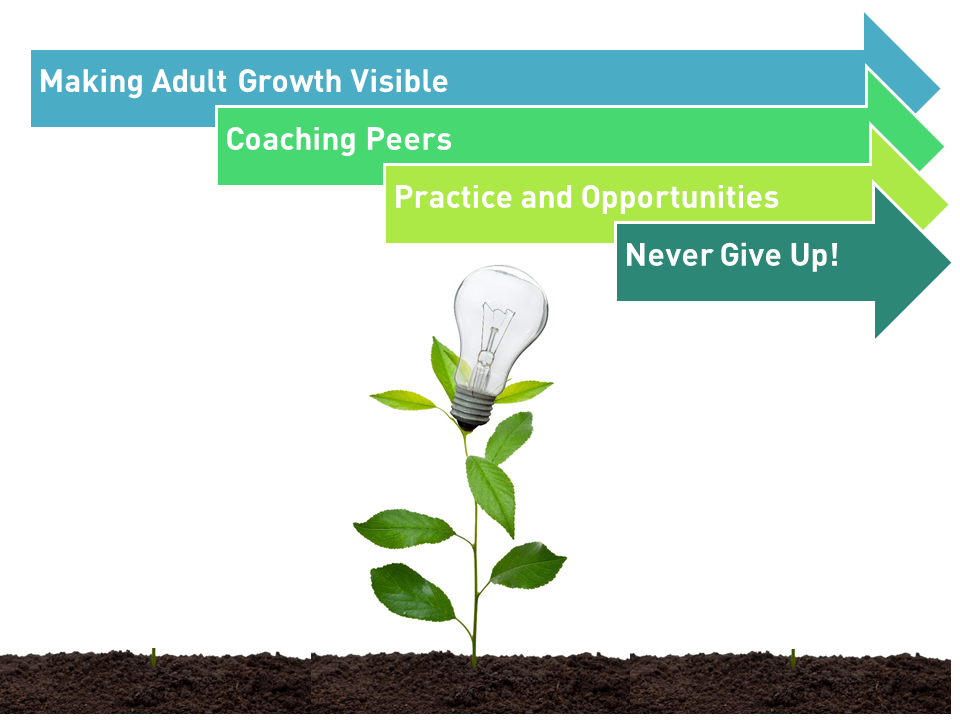This post was originally published on Houghton Mifflin Harcourt's Blog, The Spark (4.29.2016)
If you have had the pleasure of hearing Carol Dweck speak in the past few months, you will have heard what we have learned in recent years about cultivating a growth mindset in ourselves and in others. One of her slides that really resonated with the audience at the Learning and the Brain conference in San Francisco suggested that adults talk the talk, but don't walk the walk. On a stick figure graphic, a disembodied head is traveling in the opposite direction from its body. And this is a major issue: adults forget that we can't effectively cultivate or influence a growth mindset in others unless we are cultivating one in ourselves. We have to take the journey, walking in the same direction that we are talking.
This couldn't be truer for leaders. Leaders (whether that be by title or merely by influence) can influence the mindsets of other adults. No, you can't change another person. However, you can have great influence over others.
I have had the pleasure and challenge of working with many adults in a feeder pattern in California. There were pockets of excellence and hope, but we needed to scale it up so that more of these children/students/humans could benefit from hope – a belief that they could all grow their intelligence, skills, and habits – regardless of their race, income, or their past. What slapped me in the face early upon arriving in that region was that the adults also lacked that belief. I had assumed that the college-graduate adults who worked very hard as teachers every day knew they could grow and change and improve. I was wrong.
"How can we help the kids realize that people can grow if they haven't seen adults doing so?" I wondered. "And even when adults do grow, often that is presented to students as if the adults already had that knowledge. Adults don't make self-improvement transparent. How in the world, then, will students know that people do change and how to change?" I became desperate to learn how to model change for students, but also to challenge myself to be brave enough to model it for adults.
The first thing I had to ask myself was whether I up to the challenge of the time and personal risk this would take? Not just in a work week, but in my life. The answer was yes; I felt compelled by Dweck's work, as do most educators who come across it.
Here is what we (a small group of teachers, admins, and coaches) did strategically:
1. Made our own growth and learning visible: We used our influence in a purposeful and explicit way.
This was the riskiest thing we did. The early adopting educators participating in our first study decided we should try to behave differently in meetings and trainings. We spoke up when we didn't understand something. We started saying, "Can you tell me more about that?" instead of pretending to (at least sort of) know things already. We shared by saying, "You know what I learned today?" Making it explicit that we were not already perfect and knowledgeable about everything we needed to know to do our job well.
This had a profoundly positive impact on my relationships with the teachers with whom I worked closely and with the administrators I worked for. Most of them recognized that I strove be someone to learn with. Not someone to learn from. That ignited a contagious feeling of "we learn here together!" among adults. Gold.
2. Coached others who were open to engaging in this work
We shared our strategy with others. If we heard adults speaking in a fixed minded way, we found ways to gently re-frame the situation. If someone said, "These kids aren't able to do this work." We'd say, "Yes, they don't have it yet." When someone would, in their frustration say, "I've been doing this for 20 years and this is just how it is." We would say something like "I know you haven't seen change. But our challenge is so unique – let's be the ones who make progress on this."
Our constant communication of a growth mindset (humans can grow their abilities and intelligence from where they are) framed as our assumption of the human condition, not framed as "why don't you have a growth mindset?" or "why don't you stop acting like this?" gave the gift of hope and the belief in something even better than what we had.
3. Provided a lot of practice and opportunities for people to grow together
For those who were ready to take the plunge, we provided professional learning time to learn more about a growth mindset and how to apply it with students. The way this looked was that we did a few short talks at staff meetings and then waited for the excited people to email us or come to our classrooms to ask us more about it.
We shared articles and videos through email, meetings, and social media. Then we set up book studies and talked our principal into buying Dweck's book (and others) for our growing group of growth mindset evangelists to continue to learn and grow.
4. Never gave up on anyone. People always got another chance to grow!
Yes, it is impossible to help everyone. I am not suggesting that we influenced the mindset of every adult in that building. However, every interaction with adults was treated as if they were at work to grow, to learn, and that they COULD. We didn't leave people out because we didn't believe in them. We didn't walk away from difficult conversations. We stayed and did our best to have them. And (un)surprisingly, many people who we NEVER thought would "come around" – did.
We had super results not only in our relationships with each other as educators, but also in our measurable student outcomes. Once we behaved with a growth mindset professionally, we were all open to better and new practices in instruction and assessment. And it paid off for kids.
You can't change someone else's mindset. People have to know they can; they have to know how; they have to want to do the work. And they have to believe they are worth it. But you can sure as anything influence people. I hope you do.
About Emily Diehl
Emily Diehl is Director of Professional Learning for Mindset Works. She works with K-12 educators, school leaders, and parents in helping to develop agency and life-long learning. She has contributed many lessons and experience to Mindset Works’ programs. You can reach her on Twitter @EmilyADiehl
- See more at: http://www.hmhco.com/media-center/blogs/2016/april/emily-diehl-mindshift-culture#sthash.YGexCzZq.dpuf








